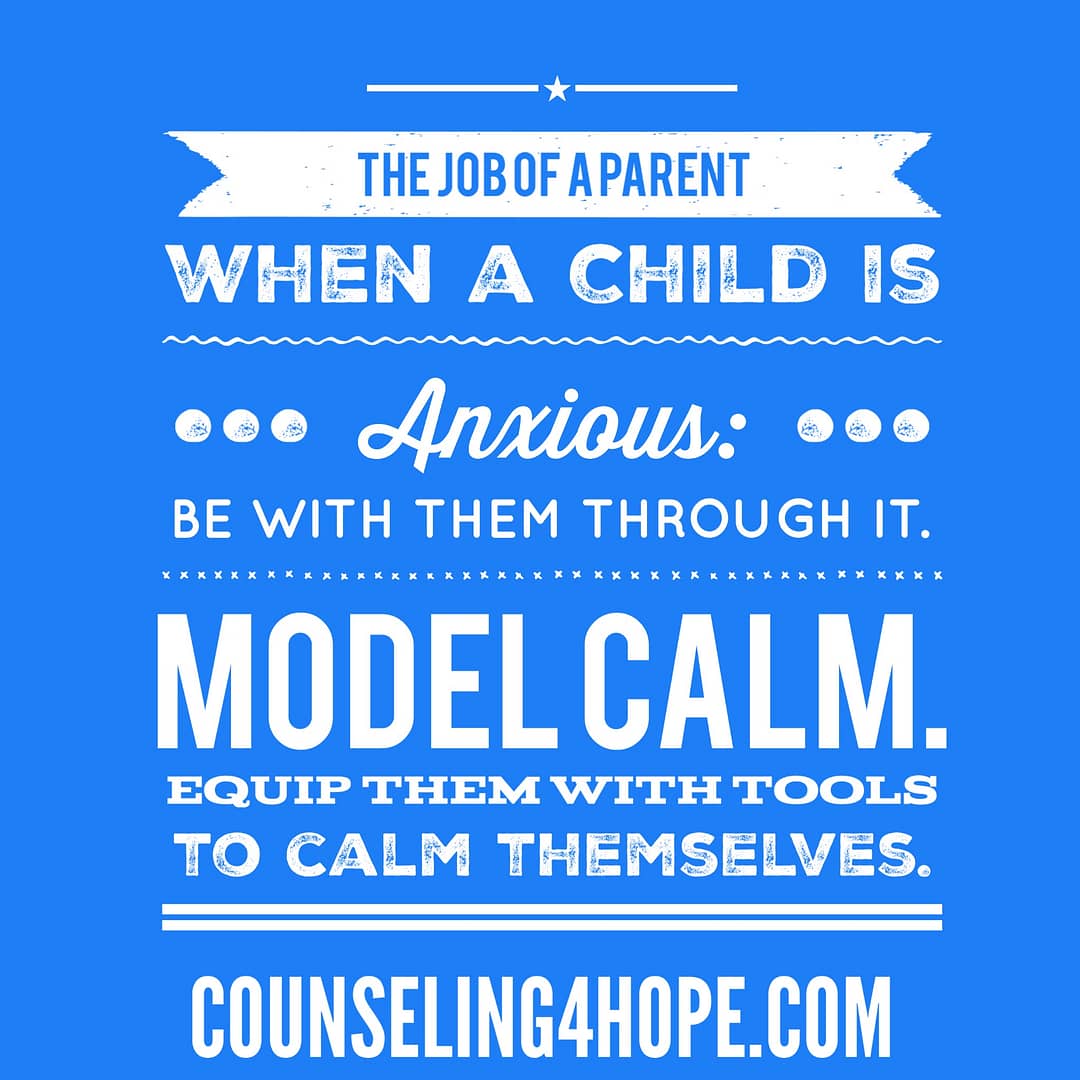Parenting anxious kids and teens can be extremely difficult and overwhelming. What seems logical often fails to work. How many of these have you tried?
Calm down!
There’s nothing to be afraid of.
Stop worrying, you’re fine.
Let me tell you why you shouldn’t be afraid.
We don’t have time for this!
You’re too old for this!
Stop whining!
Sound familiar? If your child or teen struggles with anxiety, you’ve probably found yourself saying one of these phrases. And like me, you’ve discovered that they DON’T WORK. In fact, they make things WORSE. As your child’s anxiety increase so does your own. You are overwhelmed, out of control, helpless. You don’t understand their fear. It seems unreasonable to you. How come they don’t trust you when you tell them not to be afraid? So what can you do? How do you help them?
- Deal with your own emotional reactions. Nothing can increase a parent’s frustration, anger, or anxiety quite like a child in an out of control emotional state. Take temper tantrums for example. We all are familiar with that out of control emotional experience.
When a child is in panic or high anxiety, you feel responsible for soothing them and convincing them they are safe. When your attempts don’t work, your own emotions build in response. But we all experience stress and strong emotions. None of us can be told not to feel a certain way. In fact, think of the last time your spouse told you all the reasons you shouldn’t be angry. Did your anger leave when you heard their reasons? Of course not!! What helps? When your spouse hears you out and listens. See we all have to learn to listen to our emotions and know what we need. So let’s see this as an opportunity to teach our kids.
Let’s redefine your job in your child’s anxious/panicked moment. Your job is not to convince your child not to feel fear. Your job is:
Be with them through it
Model calm
Equip them with tools to calm themselves helping them learn that they are their own safe place
- Be there for them. No matter what causes the anxiety for your child, your relationship can increase or decrease their experience. Ask yourself these questions:
- Can I stay calm?
- Am I reacting or responding?
- Am I trying to really understand their world and experience?
- Am I contributing to the stress and anxiety?
- Teach them calming Tools. There are so many tools for dealing with anxiety. Become an expert in as many of these tools as possible. If you need outside help, find a good counselor that works specifically with the age of your child and specializes in anxiety.
- Accept the Anxiety. This is key for both you and them. Don’t avoid it but accept it, welcome it, and number it based on how intense it feels. (1-10)
- Teach them to take deep, slow breaths. 4 seconds in, 4 seconds hold, 4 seconds out. Encourage them to breathe in blue for calm and breathe out red for anxiety. Maybe blow bubbles together,
- Observe the Room. Have them observe the room with their senses. 5 things they see, 4 things they hear, 3 things they touch, 2 things they smell, 1 thing they taste.
- Grounding Object. Pick out an object they can hold when they feel anxious. For my son it was a necklace with a shield.
- Imagine a Safe Place. Help them visualize a safe place. Let their imagination run free and encourage them to draw that safe place.
- Safety Motto. Come up with a safe phrase they can repeat when they feel unsafe. I am safe. I am ok. I am safe.
- Watch their anxiety number come down as they use these tools. Have them give you their number regularly throughout the episode.
- Praise their ability to bring the number down and point out their bravery in the face of fear. Give them an opportunity to reflect on how it felt to bring their number down.
- Consider the stress in their life. Today’s kids and teens are over scheduled and stressed. This can increase anxiety. We all need time to recharge. Are your kids learning to the value of down time? Are their schedules healthy and reasonable?
- Consider the message you send them. So many kids and teens with anxiety are perfectionist pleasers seeking to gain your approval and love. This is often a subtle message communicated by how you communicate with them. Do you only praise them for their performance? Do you have a lot of rules and expectations? Are rules bigger in your house than relationships? Do you frequently point out how they could improve? If so you may be unintentionally communicating, I only love you if___________. Instead, spend time encouraging your child’s deeper qualities…their hard work, compassion, care, bravery etc. Give them freedom to fail, struggle, and have weaknesses. Go here to read more about dealing with your own reactions and exceptions.
I know how much you love your kids. I know you want them to do well in life. The very fact that you are reading this tells me how much you care. Take a deep breath, give yourself grace for the past, and move forward equipped with new information. If you need to, reach out and get help. There is so much hope!


